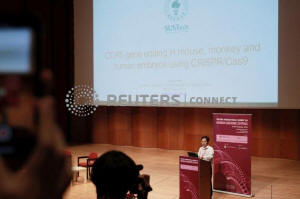|
News of their birth prompted global condemnation of the work,
raising the ethical specter of so-called designer babies in
which embryos could be genetically modified to produce children
with desirable traits.
The scientists and ethicists want to halt genetic alterations of
"germline cells" - egg or sperm cells - that can then be
inherited by others and "could have permanent and possibly
harmful effects on the species."
The global moratorium would be in place until nations can devise
international principles to guide how the technology should be
used, the experts wrote in the journal Nature. It would not
cover gene editing done in embryos for research purposes that
would not lead to a live birth.
“The governance framework we are calling for will place major
speed bumps in front of the most adventurous plans to
re-engineer the human species,” the experts said in a commentary
in the Nature. "The introduction of genetic modifications into
future generations could have permanent and possibly harmful
effects on the species,” they wrote.
Such work differs from research being conducted by numerous drug
companies and scientists into gene therapies based on editing
so-called somatic cells that affect an individual's health by
correcting a disease or condition but would not be passed on to
offspring.
Dr. Francis Collins, director of the U.S. National Institutes of
Health, said in a letter to the journal that the "NIH strongly
agrees" that a ban on the practice should go into immediate
effect and stay in place until nations can commit to
international rules to determine "whether and under what
conditions such research should ever proceed."
“There is no doubt that genome editing technologies hold huge
potential," Collins said, but added that there are too many
scientific and ethical questions that need to be answered.
Some scientists called the proposed ban unnecessary, saying it
would not prevent a scientist bent on using the technology from
editing DNA in embryos to prevent disease or enhance traits of a
child, as was the case with Chinese researcher He Jiankui.
“We do not think a moratorium would have deterred He Jiankui,
who acted secretively and in breach of a clear scientific
consensus that germline genome editing should not be used in the
clinic at this time,” Sarah Norcross, director of Britain-based
Progress Educational Trust, said in a statement.
Helen O'Neill, program director for Reproductive Science and
Women's Health at University College London, said the proposal
ignores the fact that a global ban already exists.
O'Neill said there were legal and ethical measures in place in
China and that He broke many of these rules. "It was not that he
did this because the law allowed it."
(Reporting by Julie Steenhuysen; additional reporting by Kate
Kelland in London; editing by Bill Berkrot)
[© 2019 Thomson Reuters. All rights
reserved.] Copyright 2019 Reuters. All rights reserved. This material may not be published,
broadcast, rewritten or redistributed.
Thompson Reuters is solely responsible for this content.

|
|






